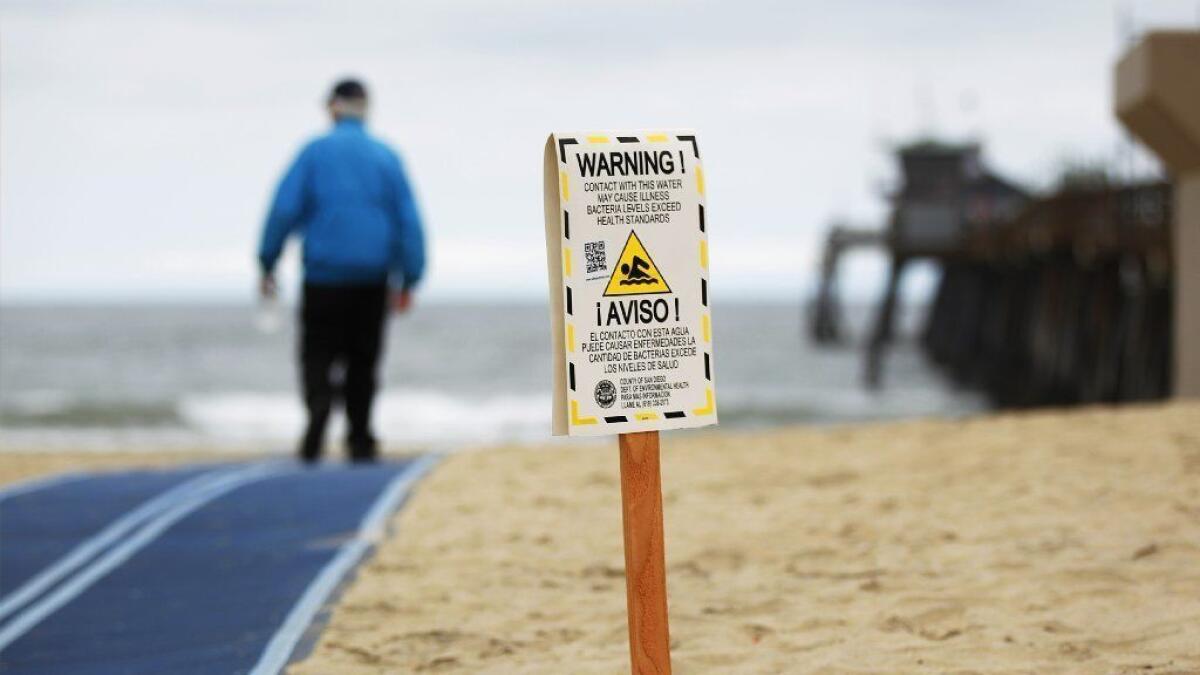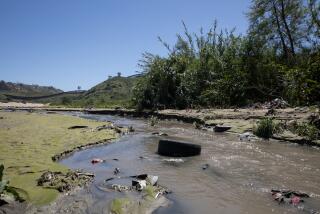Cities demand Trump administration act on Tijuana River pollution that fouls San Diego County beaches

San Diego County cities are preparing to go head-to-head with the federal government this week in a legal battle that could force the Trump administration to plug sewage spilling from Tijuana.
Local officials filed the lawsuit in March after demanding for more than a year that federal infrastructure along the border be beefed up to ensure that flows from Mexico are captured before they foul San Diego County wetlands and beaches.
On Monday, a federal court judge will hear a motion to dismiss the case filed by the U.S. Department of Justice, which is defending the International Boundary and Water Commission, or IBWC.
The cities of Imperial Beach and Chula Vista, as well as the Port of San Diego, have alleged that the IBWC is violating the Clean Water Act and the Resource Conservation and Recovery Act by not doing more to prevent the pollution.
While both Mexico and the United States spent billions decades ago to address the situation, crumbling wastewater infrastructure in Tijuana has left South Bay beaches routinely covered in a toxic soup of sewage and other contamination.
In the motion to dismiss the lawsuit, the defense has argued that the IBWC isn’t legally responsible for the renegade flows. Lawyers have pointed out that the agency has helped prevent pollution from entering San Diego County.
“Nowhere in this sequence is there an addition of pollution to a water of the United States,” attorneys for the defense said in court documents.
Lawyers for both sides would not comment on the pending litigation.
Plaintiffs said in court documents that the tainted flows constitute an improper discharge under federal water quality rules even through the pollution originated in Mexico.
The plaintiffs maintain that because IBWC oversees a flood control channel that redirects the Tijuana River on its way to the Pacific Ocean, as well as water-capture basins in five canyons along the border, the agency is responsible for the pollution that’s often conveyed through or escapes those systems.
“The [flood control channel] need not generate a pollutant to effect a discharge; the fact that it introduces a pollutant to waters of the United States is sufficient,” lawyers said in court documents.
Specifically, local elected officials hope their lawsuit will force the federal government to upgrade pumps on the Tijuana River and the capture basins in the canyons that divert flows to the South Bay International Wastewater Treatment Plant west of San Ysidro.
The case will likely move forward despite the defense’s attempts to get it thrown out early on, said UC Berkeley law professor Holly Doremus.
“It’s really hard to predict what will ultimately happen, but the claim that this has already been decided under the Clean Water Act, that’s just wrong,” she said.
What makes this case so unique, Doremus said, is the fact that the water crosses an international boundary. In cases cited in the defense’s motion to dismiss, she said, water was being diverted within the United States.
“There’s this funny situation that isn’t anticipated in the Clean Water Act, so all of those prior cases that the defense is trying to rely on are a little different,” she said. “There is no precedent for this.”
Earlier this year, state Atty. Gen. Xavier Becerra’s office and the San Diego Regional Water Quality Control Board signaled a willingness to join the lawsuit on behalf of the plaintiffs. In May, the two agencies filed a 60-day notice of intent to sue the IBWC over Clean Water Act violations.
Imperial Beach Mayor Serge Dedina has led the charge against the IBWC since his city’s shoreline was blanketed with millions of gallons of raw sewage in February 2017. Beaches as far north as Coronado were affected.
Dedina said he attended a meeting with IBWC officials last week at which he and other local officials were told by Acting Commissioner Jose Nuñez that municipalities in the San Diego region would have to pony up more money to help address the issue of cross-border pollution.
“They said we should be paying way more money to fix the problem,” Dedina said. “All our jaws were open when we heard that. That explains why we’re doing a lawsuit.”
“We have no money,” he added. “Our pockets are empty. We’re just trying to pave our streets. We barely have money for that. Until recently, we didn’t have a major grocery store.”
In response to questions about the meeting, the IBWC issued a statement that said: “The U.S. IBWC has and continues to proactively work toward the sanitation issues in San Diego.”
Imperial Beach, which includes the Tijuana Slough National Wildlife Refuge, has portions of its shoreline off-limits to swimmers roughly a third of the year on average due to sewage and other water pollution flowing from Mexico.
Smith writes for the San Diego Union-Tribune.
Smith writes for the San Diego Union-Tribune.
More to Read
Sign up for Essential California
The most important California stories and recommendations in your inbox every morning.
You may occasionally receive promotional content from the Los Angeles Times.










